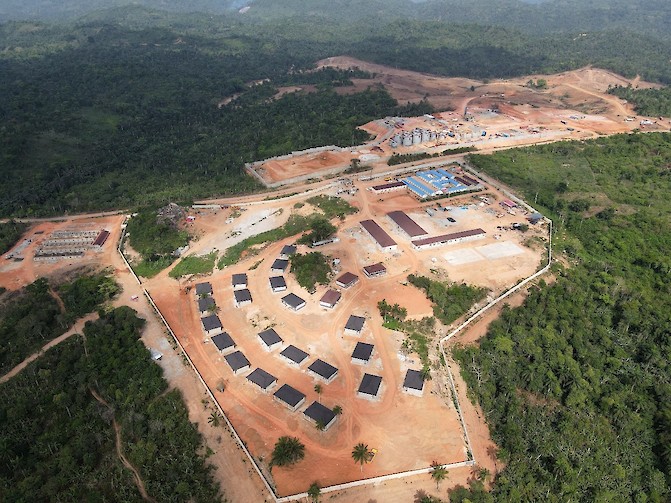Nigeria bets on new gold project to attract more miners

Carved from forested hills by excavators and explosives, Nigeria’s only industrial gold mine yielded 98,000 ounces of the precious metal last year — a key step in the efforts of Africa’s biggest crude producer to pivot away from oil.
“The more formal operations like this that we have, the better for the country,” Minister of Mines Olamilekan Adegbite told Bloomberg in December during a tour of Thor Explorations Ltd.’s Segilola mine. The project ramped up production in late 2021 and is located about 155 miles from the commercial hub of Lagos.
Nigeria has sizable untapped deposits of metals including gold, zinc, lithium and iron ore, but nearly all extraction is done by so-called artisanal miners on a small-scale or manual basis, meaning the government misses out on tax revenue. These informal activities also finance some of the armed criminal groups that operate across large swathes of Nigeria and the authorities periodically arrest Chinese nationals for illegally trading in minerals. Crude sales account for about 90% of export earnings.
“Mining in Nigeria has largely been ignored for years but the sector is now a strategic priority for the federal government,” Martin Lokanc, a senior mining specialist with the World Bank, said in an interview. “This first proper industrial scale mine, to my mind, is a very important proof of concept — It demonstrates that attractive deposits exist, and can be developed to a high technical and governance standard.”
Additional gold projects, however, are likely still some way off as the journey from discovery to mine can take 10-15 years.
Thor paid about 1.5 billion naira ($3.3 million) to the government last year in royalties on the gold it exports to a Swiss refinery owned by Metalor Technologies SA. The company is finalizing plans to transport the 4.2-kilogram bars — each worth about $260,000 at current prices — to the international airport in Lagos by helicopter rather than road to minimize risk.
Toronto- and London-listed Thor spent $120 million to build the Segilola mine and processing plant, nearly three-quarters via a debt-equity package from Lagos-based Africa Finance Corp. While far from the dimensions of Africa’s biggest gold projects — Barrick Gold Corp.’s Kibali and Loulo-Gounkoto in Mali produced 812,000 and 700,000 ounces respectively last year — the firm is looking to grow.
Funds from selling Segilola’s gold, which generated about $160 million last year, are supporting exploration work around the site aimed at expanding the project’s five-year mine life, the firm’s chief executive, Segun Lawson, said in an interview. “We certainly hope that this mine will continue running for the next 30 years or so,” he said.
Community relations
Obstacles remain, however. One will be the temptation of the next Nigerian president — due to enter office in May after elections — to modify a mining law that offers companies multiyear tax holidays and import waivers.
“Governments sometimes feel that the fiscal arrangements were too generous in the past and the government’s not getting a fair share of resource rents,” Peter Leon, Africa chair at London-headquartered law firm Herbert Smith Freehills LLP, said in an interview. “But when you’ve got a new mining destination, you need to incentivize investors.”
The industry must seek to avoid repeating the mistakes of the oil sector, which turned Nigeria into a prime example of the resource curse. Crude revenues fed corruption and production destroyed the environment, but did little to improve the lives of locals in the Niger Delta.
“One aspect is attracting the investment but for the country to realize the benefits, the environmental and social aspects need to be managed,” said Lokanc. “It doesn’t take long to lose the acceptance of the communities and we only need to look to the Niger Delta region to understand how operations can be impacted.”
Thor is eyeing opportunities elsewhere in the West African country. “When you think of Nigeria, where it is geographically, the size of it, the age of the rocks here, it’s geologically highly improbable that we have the only deposit there,” Lawson said.
(By William Clowes)
{{ commodity.name }}
{{ post.title }}
{{ post.date }}




Comments